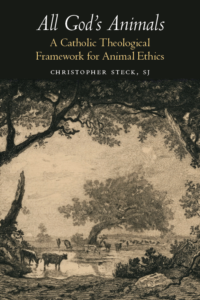http://press.georgetown.edu/book/georgetown/all-gods-animals
"All God’s Animals"
Le P. Christopher Steck, S.J., est professeur associé au Département de théologie et d’études religieuses de l’Université de Georgetown. Le P. Steck est un éthicien avec une formation en ingenierie électrique et un membre de la communauté jésuite de Georgetown.

"TOUS LES ANIMAUX DE DIEU"
Un cadre théologique catholique pour l’éthique animale
Christopher Steck SJ

Ce livre est le premier du genre à rassembler dans une conversation les points de vue de l’Église primitive, des érudits bibliques et théologiques contemporains et des enseignements post-conciliaires. Steck développe une théologie complète et catholique de l’animal basée sur une exploration approfondie des doctrines fondamentales du catholicisme - théologie trinitaire, christologie, pneumatologie, eschatologie, et sotériologie.
Tous les animaux de Dieu ont deux revendications centrales. Premièrement, nous pouvons espérer que Dieu inclura les animaux du présent âge dans le royaume inauguré par Christ. Deuxièmement, à cause de cette inclusion, nos réponses aux animaux devraient être guidées par les valeurs du royaume.
Alors que les chrétiens attendent la libération finale de toute la création, ils doivent être les témoins du royaume de Dieu en incarnant ses idéaux dans leurs relations avec la vie animale. Parce que la plénitude du royaume est encore à venir et parce que notre monde reste marqué par les blessures du péché, cependant, le traitement chrétien des animaux exigera parfois des actes qui sont en contradiction avec les idéaux du royaume (par exemple, ceux causant la souffrance et la mort). Steck examine chacune de ces idées et explore toutes leurs complexités.
Christopher Steck, SJ, qui a obtenu son doctorat à Yale, est membre du Département de théologie et d’études religieuses de l’Université de Georgetown depuis 1999. En plus de son livre The Ethical Thought of Hans Urs von Balthasar (2001), il a publié de nombreux articles traitant de questions théoriques en théologie morale catholique.
Commentaires :
"Christopher Steck ne se contente pas de revigorer le concept d’alliance comme fondement d’une approche catholique convaincante de la théologie des animaux. En s’inspirant largement des travaux de Hans Urs von Balthasar et en montrant brillamment que la faille dans la conception de Thomas d’Aquin de l’exclusivité de la rédemption pour les humains était liée à sa science erronée, il rassemble un récit provocateur d’une théologie de la rédemption pour les animaux. Le texte de Steck a donné aux chercheurs et aux étudiants une contribution importante à la littérature croissante sur la théologie et l’éthique animales " - Celia Deane-Drummond, directrice et professeure de théologie, Université de Notre Dame.
"Steck a écrit la première théologie de fond sur les animaux dans un contexte catholique romain, ce qui constitue une nouvelle contribution inestimable dans ce domaine. Son argumentation prudente et éclairée incite fortement les chrétiens à reconsidérer leur pratique, en particulier en ce qui concerne les modèles actuels d’utilisation des animaux pour l’alimentation " - David Clough, professeur d’éthique théologique, Département de théologie et des études religieuses, Université de Chester.
Georgetown University Press
264 p
Hardcover
ISBN : 9781626167148 (1626167141)
Paperback
ISBN : 9781626167155 (162616715X)
eBook
ISBN : 9781626167162

English version
The book is the first of its kind to draw together in conversation the views of the early Church, contemporary biblical and theological scholarship, and post-conciliar teachings. Steck develops a comprehensive, Catholic theology of animals based on an in-depth exploration of Catholicism’s fundamental doctrines—trinitarian theology, Christology, pneumatology, eschatology, and soteriology.
All God’s Animals makes two central claims. First, we can hope that God will include animals of the present age in the kingdom inaugurated by Christ. Second, because of this inclusion, our responses to animals should be guided by the values of the kingdom.
As Christians await the final liberation of all creation, they are to be witnesses to God’s kingdom by embodying its ideals in their relations with animal life. Because the kingdom’s fullness is yet to come and because our world remains marked by the wounds of sin, however, Christian treatment of animals will at times require acts that are at odds with the kingdom’s ideals (for example, those causing suffering and death). Steck examines each of these ideas and explores all of their complexities.
Rev. Christopher Steck, SJ, who earned his Ph.D. at Yale, has been a member of the Department of Theology and Religious Studies at Georgetown University since 1999. In addition to his book The Ethical Thought of Hans Urs von Balthasar (2001), he has published many articles dealing with theoretical issues in Catholic moral theology.
Reviews
"Christopher Steck does more than just invigorate the concept of covenant as a grounding for a convincing Roman Catholic approach to a theology of animals. By drawing extensively on the work of Hans Urs von Balthasar and showing brilliantly that the flaw in Thomas Aquinas’ understanding of exclusivity of redemption to humans was related to his faulty science, he draws together a provocative account of a theology of redemption for animals. Steck’s fluent text has given scholars and students alike an important contribution to the growing literature on animal theology and ethics."—Celia Deane-Drummond, Director and Professor of Theology, University of Notre Dame
"Steck has written the first substantive theology of animals in a Roman Catholic context, which is an invaluable new contribution to the field. His careful and well-informed argument makes a strong case for Christians to reconsider their practice, especially with regard to current patterns of using animals for food."—David Clough, Professor of Theological Ethics, Department of Theology and Religious Studies, University of Chester
